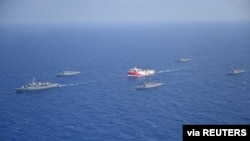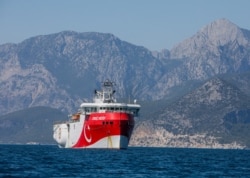Athens Thursday denied NATO Secretary General Jens Stoltenberg’s earlier statement that Greece and Turkey had agreed to “technical talks” to avoid military clashes in the region. The move, critics say, dashes hopes of a breakthrough in rising tension in the eastern Mediterranean.
Greek government spokesman Stelios Petsas said the NATO chief’s announcement did not correspond to reality. He said a series of conditions must first be met before Athens even begins to consider talks with Ankara.
"We want Turkey to abandon its provocative stance and come to the negotiating table with sincere interest. Negotiations cannot be held under threats and blackmail, the spokesman said.
Greece, Petsas said, will be neither terrorized or threatened -- diplomatic longhand for a Greek ultimatum calling on Turkey to pull back an exploration ship it has sent to the eastern Mediterranean, near a cluster of Greek islands, to search for undersea oil and gas.
Escorted by a fleet of Turkish battleships, the Oruc Reis survey vessel has drawn the attention of the entire Greek fleet, which has been watching its every move for over a month now, ready to retaliate if, as the Greek government has said, it attempts to drill in areas of the seabed Greece claims as its own.
Turkey rejects the claims, saying islands are not entitled to what is known as an exclusive economic zone. Ankara instead believes it has the right to explore the oil- and mineral-rich eastern Mediterranean seabed after a recent maritime agreement it concluded with Libya.
In recent days, the standoff between the two NATO allies has become more heated and ever more dangerous, as the Oruc Reis has moved into the Aegean Sea, nearing a cluster of Greek isles.
Analysts, among them Angelos Syrigos, believe the move is a part of a negotiating ploy by Turkish President Recep Tayyip Erdogan ahead of any potential talks.
Turkey has agreed to the negotiations but is ready to come to discussions with a grab bag of sea and territorial claims it is not entitled to by international law, Syrigos says. So, by agreeing to sit down and discuss details related to these disputed areas, it is bound to come out with something it didn’t have in the beginning.That is what Greece wants to avoid, Syrigos added.
Feuds between Greece and Turkey are hardly new. What complicates this one is that the undersea reserves are also being eyed by other countries, many of them neighboring, that have teamed together, isolating Turkey.
Erdogan has antagonized many allies and friends with his aggressive behavior in Syria, Libya and at home. Further complicating matters is that Turkey is a member of NATO, but not of the European Union.
Germany is currently leading a separate diplomatic effort to defuse the standoff between Greece and Turkey.
Analyst Costantinos Filis advises caution.
Either the other side, he says, has gone rogue and Greece should continue to be on full military alert, or this is another negotiating ploy by Erdogan in a bid to skirt potential sanctions the EU may take against Turkey because of its gas explorations.
Greece and Turkey nearly went to war 25 years ago in a dispute over uninhabited Aegean islets. Since then, they have lived in an uneasy détente.





